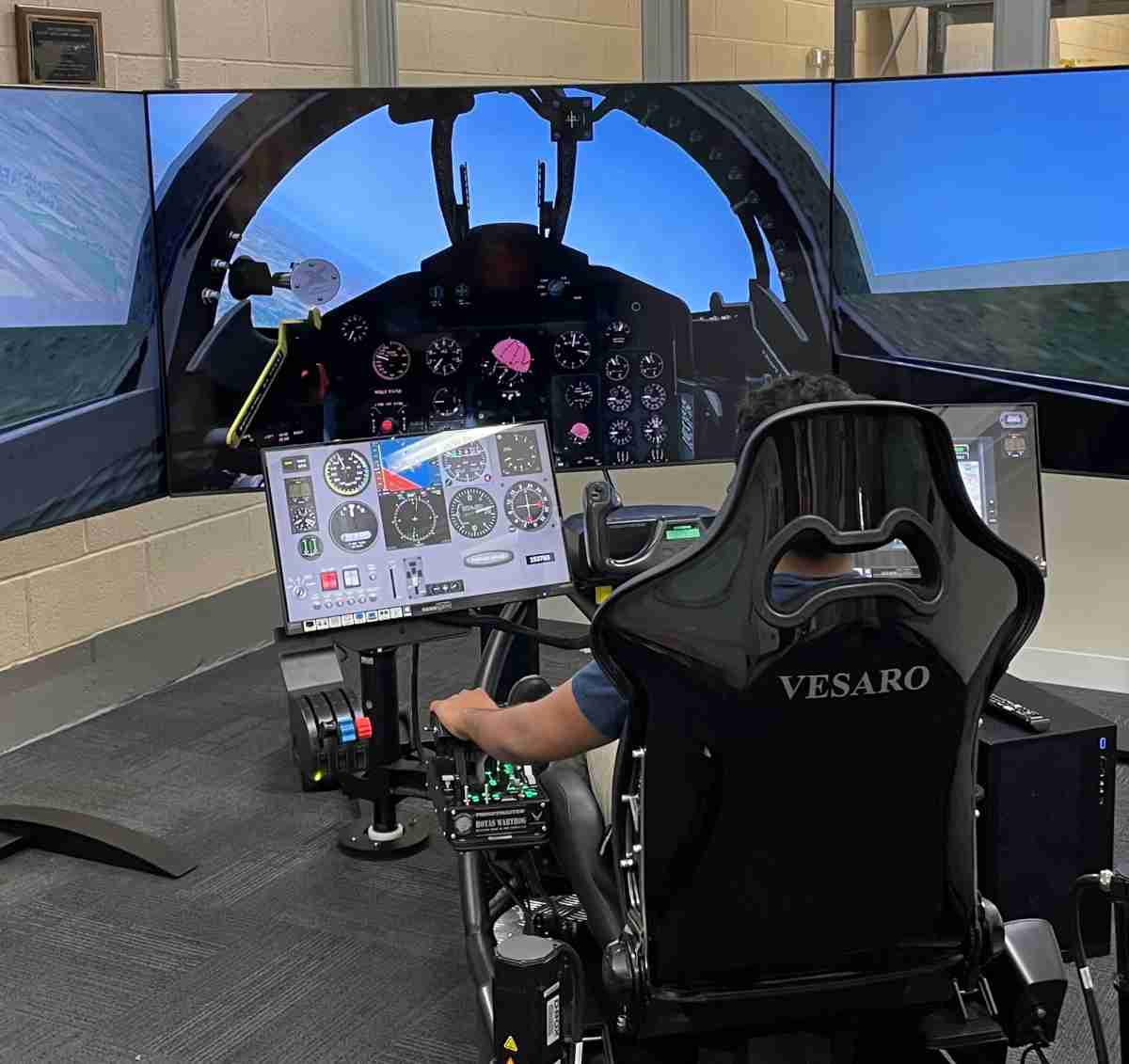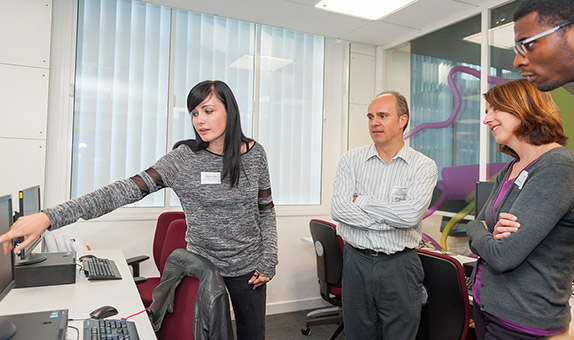Engineering Foundation with pathways in Aerospace, Civil, Mechanical Engineering

Teaching Excellence Framework (TEF) Gold award
Our commitment to high quality teaching has been recognised with a TEF Gold rating. The University has received an overall rating of Gold, as well as securing a Gold award in the framework's two new student experience and student outcomes categories.
Why choose this course?
This course is ideal if you would like to join one of our engineering honours degrees but need a preparatory period of study. It provides an alternative entry route if you do not meet our standard entry requirements but have the ability to succeed at degree-level study.
The foundation year in engineering will develop your practical, technical and communication skills, and you'll apply your knowledge to real-life problems. It's taught at the University and you'll have access to all its facilities.
Modules reflect the degree subject you choose but will include one of the following:
Engineering
You'll gain study skills for your degree, look at relevant career options and be introduced to business and project management.
Professional Success
You'll gain study skills for your degree, look at relevant career options and be introduced to business and project management.
Foundation Project-based Learning
You'll work on independent and group projects in your subject area, developing skills in team working, critical thinking and data handling.
Once you have completed this course, you can join a BEng (Hons)/MEng (Hons) engineering degree of your choice, dependent on satisfactory grades.
To apply for the foundation course, please use the application link on the course page of your chosen pathway.
Choose your pathway
- Aerospace Engineering MEng/BEng (Hons)
UCAS code: H408 - Aerospace Engineering (Space Technology) MEng/BEng (Hons)
UCAS code: H405 - Civil Engineering BEng (Hons)
UCAS code: H218 - Mechanical Engineering MEng/BEng (Hons)
UCAS code: H308 - Mechanical Engineering (Automotive Engineering) MEng/BEng (Hons)
UCAS code: H322
Please note: From September 2025 entry, this course will be called Foundation Year in Engineering.
| Attendance | UCAS code | Year of entry |
|---|---|---|
| 1 year full time | UCAS codes are included on the relevant webpage for the course you would like to study | 2024 (Clearing) 2025 |
| Main Location | Penrhyn Road and Roehampton Vale |
Reasons to choose Kingston University
- The Aerospace Engineering BEng/MEng course received 100% for satisfaction for learning resources (National Student Survey 2018).
- The Civil Engineering BEng degree is accredited by the Joint Board of Moderators (JBM).
- 100% of students from the Mechanical Engineering BEng/MEng course are in highly-skilled employment or further study six months after graduating (DHLE 2016/17).
What you will study
Each module is designed to provide you with the opportunity to develop your knowledge and specific transferable skills appropriate for entry to Year 1 of your chosen engineering degree course.
Please note: for student funding purposes, this is not a separate, stand-alone course, but is designed to form an integral part of a BEng (Hons) or MEng (Hons) degree.
Modules
You will study introductory modules in applied mathematics, engineering mechanics and science required for the later years of your engineering degree. You will begin to learn to conduct and analyse engineering experimental work and to use relevant computing software. You will also be introduced to fundamental communication and study skills.
Core modules
Professional Success
30 credits
This is a core module for all students on the Foundation year in Science, Engineering and Computing. It complements and supports the subject content of the other modules within the programme. The focus of the module is the development of a range of academic study skills, contextualised to the student's chosen subject. This in turn allows students to become independent, resilient and reflective learners who will be able to succeed in subsequent levels of degree study.
The module provides an early appreciation of the career opportunities that the degree leads to, which in turn allows students to determine the employability skills they need to develop. To boost employability, the basic principles of Business and Project Management are introduced to students in the context of their chosen degree subject. The personal tutor scheme is embedded within the module and is linked to students' development log and aspects of employability.
Foundation Project-Based Learning
30 credits
This is a core module for all students on foundation years in Science or in Engineering and Computing. It is designed to allow students to develop a number of the skills introduced in the Professional Skills module, in particular those relating to critical thinking, problem solving and group work. The focus of the module is on project-based learning as applied to real-world scenarios and/or problems in the degree subject area of the student.
Engineering
60 credits
This is a core module for the level 3 Engineering Foundation Course. It introduces the student to basic mathematical techniques, mechanics and science used in engineering and technology studies. The module is primarily delivered through lectures and laboratories supported by tutorials; additional support material will be made available on CANVAS – our virtual learning platform.
Future Skills
Knowledge to give you the edge
Embedded within every course curriculum and throughout the whole Kingston experience, Future Skills will play a role in shaping you to become a future-proof graduate, providing you with the skills most valued by employers such as problem-solving, digital competency, and adaptability.
As you progress through your degree, you'll learn to navigate, explore and apply these graduate skills, learning to demonstrate and articulate to employers how future skills give you the edge.
At Kingston University, we're not just keeping up with change, we're creating it.

Entry requirements
If you would like to join us through Clearing 2024, please call our Clearing line on 0800 0483 334 (or +44 020 8328 1149 if you are calling from outside the UK) and speak to our friendly and knowledgeable hotliners who will be able to provide information on available courses and will guide you through your options.
Please note the entry requirements listed below are for 2025 entry only.
Teaching and assessment
Teaching includes lectures, seminars, tutorials and practical laboratory sessions. Assessment comprises exams and coursework (e.g. reports, computer and numerical exercises, laboratories and essays).
Who teaches this course?
The course is taught at the Faculty of Science, Engineering and Computing. Faculty staff have a wide range of experience across research and industry and continue to practice and research at the cutting edge of their discipline. This ensures that our courses are current and industry informed ensuring you get the most relevant and up-to-date education possible.
Staff will use their experience and professional networks to hone your skills and shape you into the next generation of science, technology, engineering and mathematics (STEM) graduates.
Postgraduate students may run or assist in lab sessions and may also contribute to the teaching of seminars under the supervision of the module leader.
Course fees and funding
Additional costs
Depending on the programme of study, there may be extra costs that are not covered by tuition fees which students will need to consider when planning their studies. Tuition fees cover the cost of your teaching, assessment and operating University facilities such as the library, access to shared IT equipment and other support services. Accommodation and living costs are not included in our fees.
Where a course has additional expenses, we make every effort to highlight them. These may include optional field trips, materials (e.g. art, design, engineering), security checks such as DBS, uniforms, specialist clothing or professional memberships.
Facilities
There is a wide range of facilities for practical work at our Roehampton Vale campus, where this course is based. You will have access to a modern environment with the latest technology and industry-standard equipment, including:
- 3D design studio and workshop
- mechanical engineering workshop
- rolling roads
- automotive testing facilities
- a Lotus Exige
- cars and motorcycles built by engineering students.
The recently enlarged library at Roehampton Vale provides collections of specialist engineering books and journals.
The £4 million Hawker Wing provides three floors of extra space for students and staff at Roehampton Vale, including improved learning and teaching facilities.
What our students say
After you graduate
Once you have completed this course, you can join a BEng (Hons) or BSc (Hons) engineering degree of your choice at Kingston University in the fields of aerospace engineering, civil engineering, construction management, mechanical engineering, automotive engineering or motorsport engineering, dependent on satisfactory grades.
Course changes and regulations
The information on this page reflects the currently intended course structure and module details. To improve your student experience and the quality of your degree, we may review and change the material information of this course. Course changes explained.
Programme Specifications for the course are published ahead of each academic year.
Regulations governing this course can be found on our website.





